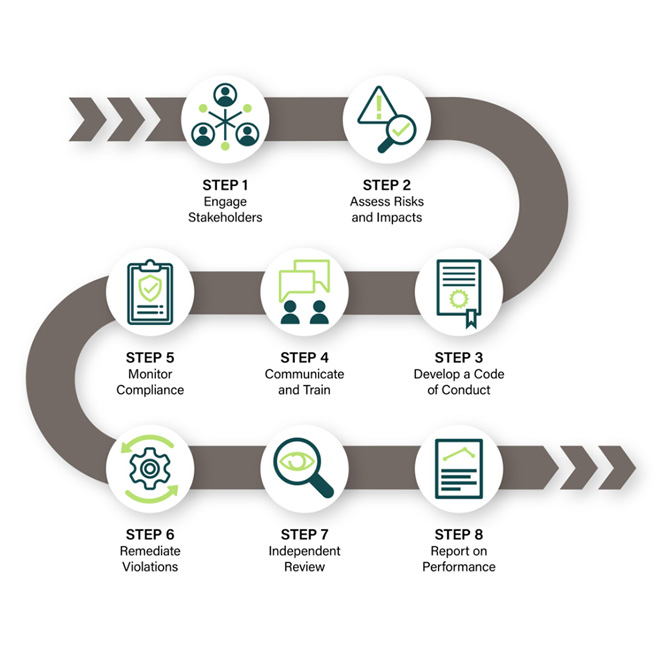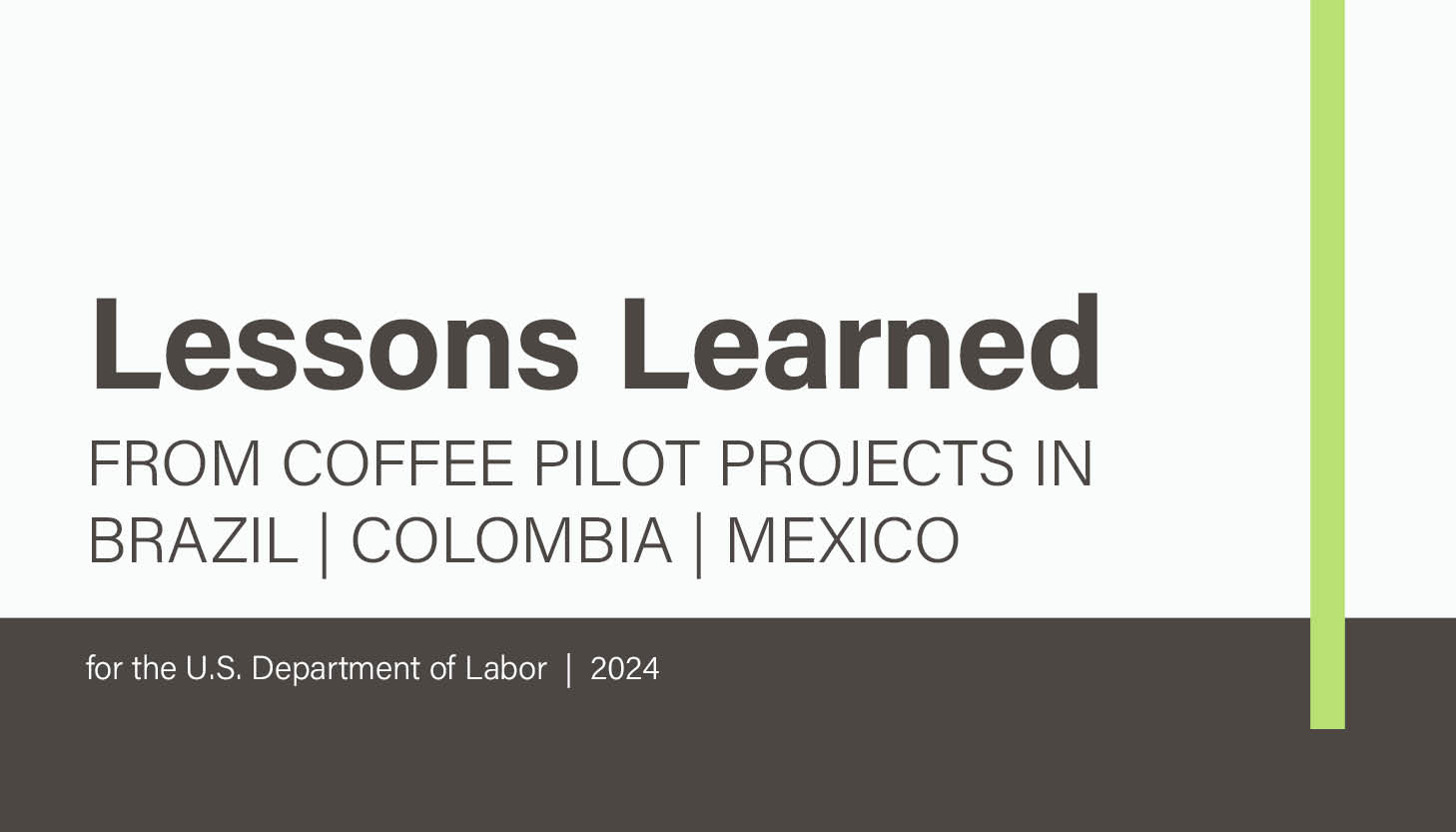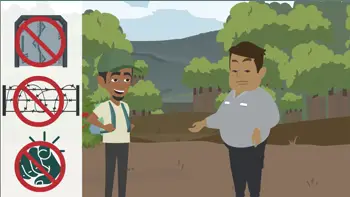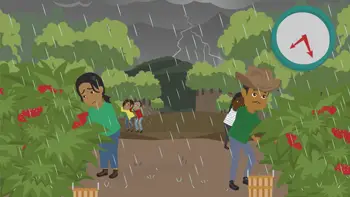Providing knowledge and tools that benefit
workers, farmers, and companies
Research-based tools
Verité research has documented an elevated risk of forced and child labor in the Latin American coffee sector. Discrimination, underpayment of wages, excessive hours of work, and health and safety violations have also been identified in Latin America and other coffee-producing countries worldwide.
Reliable data and actionable guidance can help coffee companies mitigate these risks in their supply chains and comply with emerging human rights due diligence legislation. It can also help coffee farmers and farm groups at origin to comply with local labor laws, buyers’ codes of conduct, and certification standards.
Verité’s Cooperation on Fair, Free, Equitable Employment (COFFEE) Project was a multi-stakeholder partnership from 2017-2024 focused on documenting the realities of farm work in the coffee sector and providing pathways to labor compliance and full worker protection. Through in-depth research in Colombia, Mexico, and Brazil, Verité pinpointed key root causes of the most salient labor risks at the farm level. Verité then developed a suite of tools to help various actors, retailers, roasters, traders, coffee cooperatives, farmers, farm monitors, and others address them.

Complete
COFFEE Toolkit
The COFFEE Project developed the Toolkit in close alignment with USDOL’s Comply Chain Framework.
The toolkit focuses on creating a virtuous cycle of continuous improvement to address labor risks in company supply chains. The toolkit consists of 20 downloadable and printable tools, 7 videos, and an interactive Risk Evaluation for Action in the Coffee Trade (RE-ACT) Dashboard. All of the document and video-based tools are available in English, Spanish, and Portuguese. While a variety of tools may be relevant to each stakeholder group, the sections below list the most relevant tools for each group.
Tools by
Stakeholder Group
Through a process of stakeholder consultation, Verité identified the tools that are most relevant for each group of key actors in the coffee sector. In the accordion to the right, you can click on the plus sign to view the tools we judged to be most relevant to each stakeholder group. However, you may find that other tools contained in the full toolkit above may also be relevant to your company or organization.
Retailers, Roasters & Traders
- Tool 1: Definition and Concepts
- Tool 2: Primer on Labor and Recruitment-Related Risks in the Latin American Coffee Sector
- Tool 9: Guidance on Stakeholder Engagement
- Tool 10: Risk Evaluation for Action in the Coffee Trade (RE-ACT) Dashboard
- Tool 13: Self-Assessment Questionnaire (SAQ) for Coffee Traders
- Tool 18: Sample Code of Conduct Provisions
- Tool 19: Sample Social Responsibility Agreements
- Tool 20: Guidance on Communication and Training Across the Supply Chain
- Tool 23: Root Cause Analysis of Labor Violations in the Coffee Sector
- Tool 24: Guidance on Response and Remedy
- Tool 28: Guidance on Public Reporting
Cooperatives, Medium & Large Farms
- Tool 1: Definitions and Concepts
- Tool 2: Primer on Labor and Recruitment-Related Risks in the Latin American Coffee Sector
- Tool 9: Guidance on Stakeholder Engagement
- Tool 15: Self-Assessment Questionnaire (SAQ) for Coffee Producers
- Tool 16: Self-Assessment Questionnaire (SAQ) for Labor Brokers
- Tool 18: Sample Code of Conduct Provisions
- Tool 21: Guidance on Monitoring of Labor Brokers
- Tool 23: Root Cause Analysis of Labor Violations in the Coffee Sector
- Tool 24: Guidance on Response and Remedy
- Tool 26: Worker Interview Questions
Smallholder Farmers & Small Cooperatives
- Tool 3: Video: What is child labor?
- Tool 4: Video: What is forced labor?
- Tool 5: Video: Indicators of Forced Labor
- Tool 6: Video: Recruitment and forced labor case study
- Tool 7: Video: Discrimination against women in the coffee sector
- Tool 8: Booklet: Recruiting and hiring workers in the coffee sector
- Tool 9: Guidance on Stakeholder Engagement
- Tool 11: Video: Child labor risks
- Tool 12: Video: Recruitment-related risks
- Tool 15: Booklet: Self-Assessment Questionnaire (SAQ) for Coffee Producers
- Tool 17: Booklet: Self-Assessment Questionnaire (SAQ) for Labor Brokers
- Tool 22: Booklet: Monitoring of labor brokers in the coffee sector
Auditors & Monitors
- Tool 1: Definitions and Concepts
- Tool 2: Primer on Labor and Recruitment-Related Risks in the Latin American Coffee Sector
- Tool 10: Risk Evaluation for Action in the Coffee Trade (RE-ACT) Dashboard
- Tool 25: Guidance on Independent Auditing of Coffee Farms
- Tool 26: Worker Interview Questions
- Tool 27: Labor Broker Interview Questions
Civil Society & Government
- Tool 1: Definitions and Concepts
- Tool 2: Primer on Labor and Recruitment-Related Risks in the Latin American Coffee Sector
- Tool 9: Guidance on Stakeholder Engagement
- Tool 10: Risk Evaluation for Action in the Coffee Trade (RE-ACT) Dashboard
- Tool 23: Root Cause Analysis of Labor Violations in the Coffee Sector
- Tool 26: Worker Interview Questions
- Tool 27: Labor Broker Interview Questions
- Tool 28: Guidance on Public Reporting

Online Training Modules
Verité has developed a set of 14 interactive, self-paced online training modules covering international standards and best practices related to child labor, forced labor, recruitment, and gender issues. All of the modules are available in English, 13 are available in Spanish, and 11 are available in Portuguese.
You can create a username and password and access all of the training modules in the following link: https://coffee-verite.talentlms.com/
More COFFEE Resources
About the COFFEE Project
The Cooperation On Fair, Free, Equitable Employment (COFFEE) Project was funded by the U.S. Department of Labor’s Bureau of International Labor Affairs (USDOL-ILAB) under cooperative agreement number IL-31476.”




